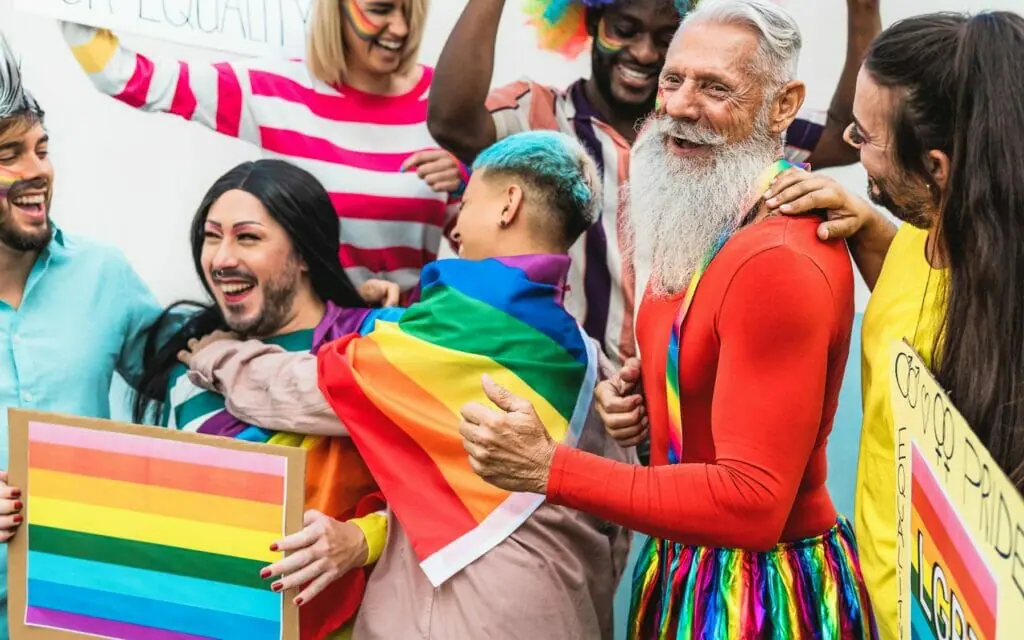Anyone can feel attached to or identify with a diversity of gender identities and/or sexual orientations. And as evermore definitions have been popularised over the years to embody the emotions and experiences of queer people, it can be hard to keep up.
If you are not totally absorbed in LGBTQ+ culture or the rainbow community, you may not appreciate these lesser-known sexual orientations and gender identities – most of which have a lack of representation in mainstream media.
One such term is greysexual, so we are going to define and cover what does greysexual mean, speak about the greysexual pride flag, and then provide some tips to help you become a better ally to greysexual people.
In this article we will cover...
What Does Greysexual Mean?
Greysexuality is also spelled as graysexuality. Other terms for greysexuality include gray-asexuality, gray-A, or gray-ace. Greysexuality is a sexual identity that refers to feeling a limited sexual attraction.
Greysexual people rarely feel sexual attraction. The intensity of their sexual attraction can be low and/or can happen in specific circumstances. It isn’t clear when the term greysexual was first used. However, the asexual community has used it for many years. Greysexual people sometimes feel like they’re in the grey area between typical sexual interest and asexuality.
Greysexuality is more about the ‘grey areas’ of life. Greysexuality doesn’t lie within the rigid, societally-constructed and enforced binaries. Greysexuality and asexuality are often confused for each other. Greysexual people rarely experience sexual attraction, or may experience it with low intensity. It can describe people that identify as asexual but don’t fit into the primary types of asexuality.

The three major types include:
- Sex repulsed: refers to those who are disinterested or completely repulsed by any ideas of sex.
- Sex-neutral: they aren’t repulsed by sex but will also not go out of their way to seek it. Such people may still have sex just to please their partner if they’re in a relationship.
- Sex-positive: this is an asexual individual (one who doesn’t feel sexual attraction to other people) that will have sex only for pleasure.
Judging from the descriptions, greysexuality can be a little confusing and hard to define. It characterizes a sexual gray area. The vagueness of the term is, however, intentional. It is meant to accommodate those who identify somewhere between sexual and asexual. While they might experience occasional sexual attraction, most of the time, they don’t.

It is possible for a greysexual person to have past sexual experiences that don’t reflect their sense of self or their sexual identity. Some people might identify with the term because they do not frequently experience sexual attraction that is strong enough to pursue or act on.
Greysexuality, as with other sexual identities, is a unique experience for each individual. Some of the most common characteristics of greysexual include:
- Not making sexual attraction a priority when choosing a romantic partner.
- Sex is not important.
- There may be sexual attraction, but it isn’t often.
- Focusing more on non-sexual ways to show love and affection for a partner.

The Greysexual Pride Flag Meaning
There are many different pride flags symbolizing most queer identities, so it should come as no surprise there is a flag for greysexual people to proudly fly.
Milith Rusignuolo designed the greysexual flag in 2013. The original greysexuality flag was a symbol of movement from no sexual attraction (represented by the color purple for asexuality) to entering an occasion of attraction (grey to white with white representing allosexuality on the asexual flag), then back to asexuality.
The most recent greysexual flag was designed on the LGBTA+ wiki discord by user nyoomstar. The flag represents the feeling of being in the grey zone represented by grey borders around the purple ace colors. The purples are slightly darker to hint at the uncertainty associated with being greysexual and also to give it a touch of an easy-to-recognize and modern look.
When is Greysexuality Pride Day
Education, visibility, commemoration, and appreciation are all critical in promoting global acceptance and acknowledgment of queer identities and queer folx in general. And from experience, we know it is easier for greysexuals to talk to friends and loved ones – and to feel the love – when a worldwide day for greysexuality is observed. Not to mention it also helps foster awareness and increased sensitivities from society at large.
So, mark your calendar and do something special (even if it’s just a social media post!) for Greysexuality Pride Day next June 8th.
Other Greysexual Information to Help You Be a Better Ally
No greysexual experience is identical to another. You can’t tell whether someone is greysexual by looking at them, observing their personality, or their physical aesthetic. None of these characteristics can provide a clue as to how a person identifies, and this is as true for greysexuals as it is for any gender or sexual orientation.
The first thing you should do as an ally to greysexual people is to believe them when they tell you about their identity. Don’t try to argue them out of it or make the mistake of thinking you could know more about how they feel than they do. It could also help if you worked on your mindset. Working on your attitude means you challenge your concept of gender, sexuality, and sex.
After all, if you have any issues with understanding greysexuality, the root cause is bound in your understanding of gender and sexuality – not theirs. Educating yourself (as you are by reading about what does greysexual mean?) is an excellent first step to increase your awareness and not make your lack of knowledge in this area a burden on them.
There aren’t any explicit rules or guidelines, but here are some thoughts on how you can be a better ally and support a loved one as you discover what it means to be greysexual.

Greysexuals are part of the ace community
Some grey aces may experience sexual attraction occasionally, have a low sex drive, but also enjoy occasional sex. There are also those that are ambivalent about sex. Even though one may have a strong emotional attraction to their partners, they might not crave sexual intimacy.
If some greysexuals were presented with the option of not having any sexual contact with someone else for the rest of their lives, it wouldn’t have an impact in their lives.
Greysexuality has nothing to do with past trauma
Like every other sexual or gender identity, greysexuals could have experienced sexual trauma at some point in their life. While it may be hard to separate some elements of their sexuality from past trauma responses, greysexuality is still a valid identity. Unfortunately, some who aren’t able to separate past trauma from their sexuality keep invalidating themselves about their ace spectrum.
It is important to realize that no matter where the greysexuality is coming from, their experience of sex is stable and is an essential part of their relationship with sexuality and their sexual identity. Everyone is should be allowed to own that part of themselves.
Understand that greysexuality has nothing to do with one’s past trauma and that even if it does, it is still a valid identity.

Hyper-sexualization of black people has a negative effect on those who identify as greysexual
Black people are often hyper-sexualized in many different situations. This can be done by would-be-partners, lovers, strangers, and even medical professionals. As a result, black greysexual people are made to endure various assumptions of their bodies by people who most likely don’t even have a chance of being close to them.
While many people view black hyper-sexualization as a compliment or something to ogle at, it causes a lot of harm by directly feeding rape culture by displaying black bodies as those that sex happens to or is done to without the need for consent that comes with an emotional bond between people.
Be patient with those still exploring, questioning, or confused about their identity
As we mentioned before, greysexual people can invalidate their identity by focusing more on past traumas. As a result, they may start to think that something is wrong with them. Even if they don’t have past traumas, it’s pretty common for ace people to be confused about their identity.
If your loved one is struggling or confused about their identity, be patient with them as they try to explore and question who they really are. Validate them when they tell you who they are and if it changes, that’s ok, too. Like everything else under the sun, their feelings might change so it’s best to accept them as they are.





